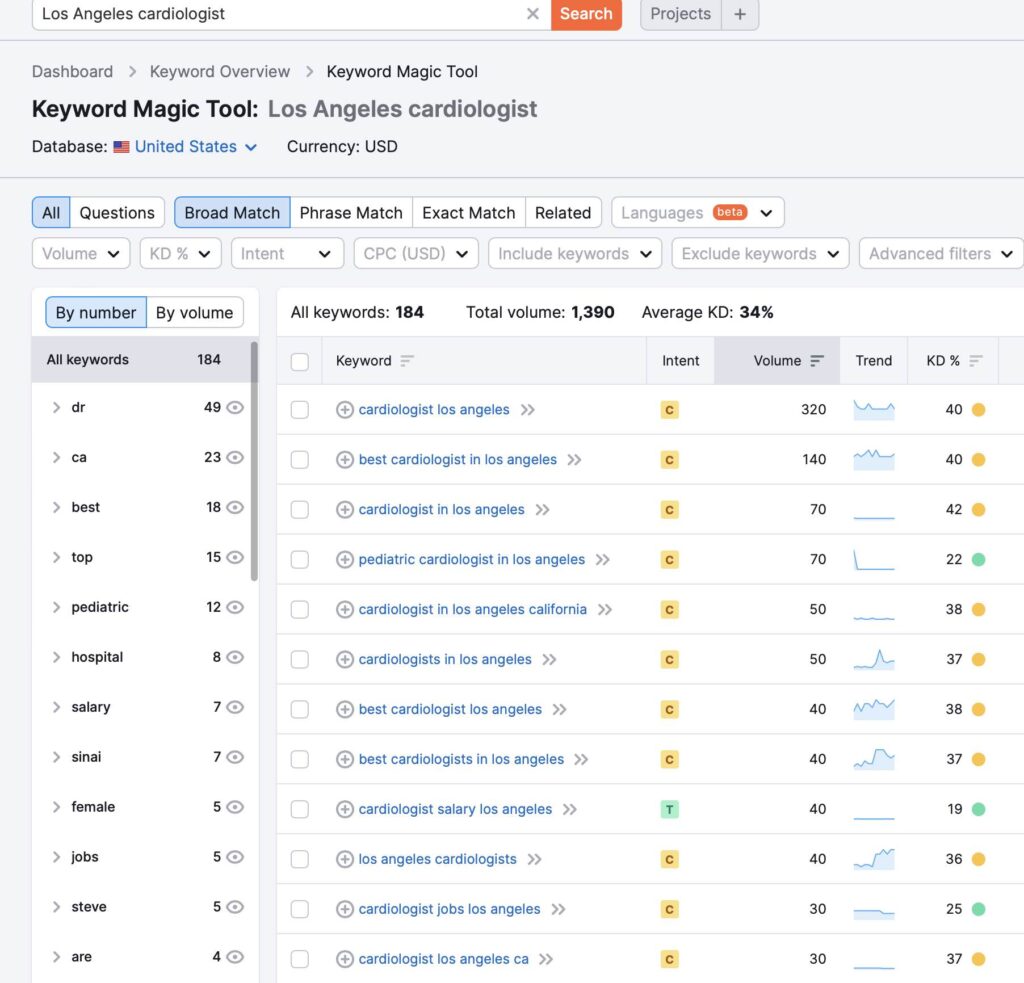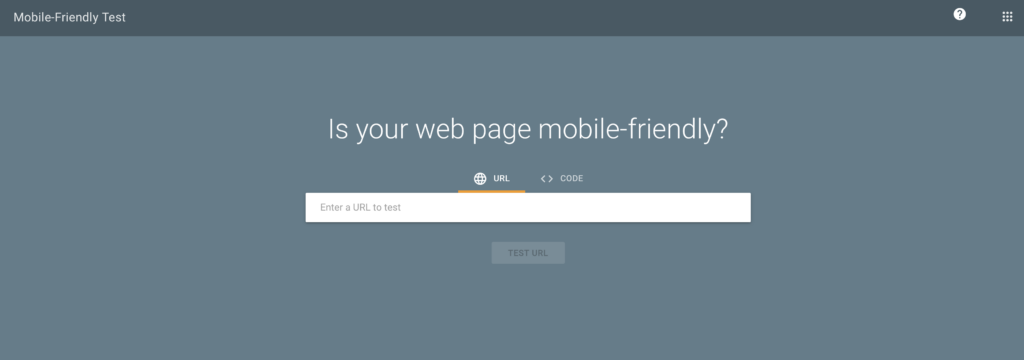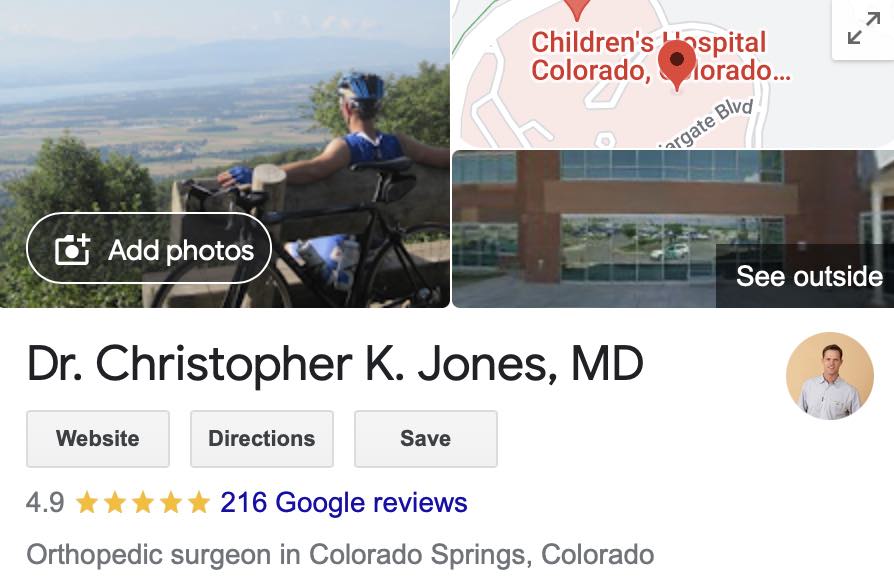Local SEO for Doctors is becoming more and more important as time goes on. With so many people using the internet to find doctors and health-related information, it’s essential that your website ranks well in local search results.
In this guide, I will discuss what local SEO is, how it works, and why it’s important for doctors’ websites. I will also provide some tips to help you rank better in local search results!
What Is Local SEO and Why Do Doctors Need It?
Local SEO (SEO = Search Engine Optimization) is the process of optimizing your medical website for local search results. This means that when someone searches for a doctor or medical information in their area, your website will be more likely to show up in the top results.
For example, when someone does a Google search for “doctors in Los Angeles“, the top results will be websites that have optimized their local SEO.
Local SEO is important for doctors because it helps you to be found by potential patients who are looking for a doctor like you in your area. If your website ranks well in local search results, you are much more likely to get new patients.
How many patients search for healthcare providers online?
The most recent data suggests that 81% of patients search for healthcare providers online before scheduling an appointment with a healthcare professional. This number is only going to grow as time goes on, which means that local SEO is becoming more and more important.
How Do Search Engines Work?
In order to understand how local SEO for doctors works, it’s important to understand how search engines work.
Search engines like Google are designed to help people find information on the internet. They do this by crawling the web and indexing websites so that they can be shown in search results.
When someone does a search, the search engine looks through all of the websites that it has indexed and shows the most relevant results. The non-advertisement results that show up are considered organic search results. While Google Ads certainly have a role to play in digital marketing for medical professionals, organic local rankings are really what will help increase website traffic and determine the long-term success of local SEO for doctors.
Organic search vs. Google Ads
When local SEO for doctors is successful, it will result in your website appearing in the organic search results. This is different from Google Ads, which are the sponsored results that show up at the top of the page.
While online Ads can be a great way to get more traffic to your website, it’s important to understand that local SEO is what will help you to get more organic traffic. This is the traffic that comes from people finding your website in the search results without you having to pay for it.
In other words, local SEO is a long-term investment that will pay off over time for a local medical practice, while Ads are considered more short-term as far as SEO strategies go.
How Does Local SEO for Doctors Work?
Local SEO works by optimizing your website for specific keywords related to your location. For example, if you are a doctor in Los Angeles, you would want to optimize your website for keywords like “Los Angeles doctor” or “doctor in LA.”
You can also optimize your website for specific medical conditions or treatments that you specialize in. For example, if you are a cardiologist in Los Angeles, you could optimize your website for keywords like “cardiologist in Los Angeles” or “Los Angeles cardiology.”
This is the keyword research phase, and it’s important to make sure that you are set up to attract your target market with the right keywords for your healthcare website.
How Can Doctors Do Keyword Research?
There are a few different ways to do keyword research. My favorite way is using a tool called SEMRush. SEMRush is a tool that allows you to see how much traffic certain keywords get, as well as what the competition is like for those keywords.
To use SEMRush, just go to their website and type in a keyword that you want to rank for. For example, if you want to optimize your website for the keyword “Los Angeles cardiologist,” you would type that into the SEMRush search bar.
Once you do that, SEMRush will give you information on the monthly search volume for that keyword, as well as what the competition is like. The competition score is based on a scale of 0-100, with 100 being the most competitive. A good rule of thumb is to target keywords that have a competition score of 40 or less.

Another great feature is that SEMRush will give you a list of related keywords that patients are using for their local searches. Understanding the actual search queries that local patients are using can help you understand how to attract more patients.
Speaking from experience, you’ll want to have patience during this phase. It can take a long time to identify the local keywords and relevant searches for your medical practice or personal website. Once you have targeted the right keywords, you can start optimizing your own site for local SEO.
Google’s Local Intent Algorithm
Google’s Local Intent Algorithm is a set of rules that determine when and where to show Localized Google Maps Listings in the SERPs. Local intent can be determined by many factors, but some of the most common include:
- The user’s location
- The user’s search history
- Whether or not the user is using a Local IP address
- The user’s device (ex. Mobile vs. Desktop)
- What time of day it is
For example, if someone Google searches for “healthcare professionals near me” on their desktop computer in the middle of the day while most medical practices are open, Google is more likely to show Google Maps Listings in the SERPs.
Tips to Help Local SEO for Doctors
Now that you understand how Local SEO works and what goes into Google’s Local Intent Algorithm, here are some tips on how to optimize your website for Local SEO:
Have a Mobile Friendly Website
Medical SEO is all about mobile these days. Google’s Algorithms takes into account the user’s device when determining whether or not to show Localized Google Maps Listings in the SERPs. The majority of devices being used today across all business categories are mobile.
To make sure your website is mobile friendly, you can use Google’s Mobile-Friendly Test tool. Just enter your website’s URL and Google will tell you if your website is mobile friendly or not.

If your website is not mobile friendly, you need to fix that as soon as possible. Mobile-friendliness is now a ranking factor for all medical websites, so you could be missing out on valuable website traffic if your website is not optimized for mobile devices.
Create and Verify Your Google Business Profile
Google My Business is a free listing that allows doctors and healthcare practices to control how they appear on Google Maps and in local searches.
Make Sure Your NAP (Name, Address, and Phone Number) Is Consistent
One of the most important things in local SEO for doctors is making sure that your NAP (Name, Address, and Phone Number) is consistent across all local directories and business listings. This includes healthcare specific directories such as Vitals, Healthgrades, Yellow Pages (yes, this is still a thing online), and others.
If your NAP is not consistent, it will confuse Google and hurt you when it comes to organic SEO.
Encourage Patients to Leave Online Reviews, Especially Google Reviews
Google reviews are important factors in Local SEO for doctors. Positive reviews help show Google that your practice is legitimate and helps you attract new patients by having a positive online reputation.

To encourage patients to leave online reviews, make it easy for them by having a link on your website (preferably on the homepage) and/or send an email after their appointment with links to leave online reviews.
Pro tip: If you’re worried about what to do if you receive a negative review, congratulations, you’re normal. Many doctors struggle with this aspect of online reputation management, so I’ve written about some review management steps you can take here.
Monitor and Manage Your Online Reputation
Whether we like it or not, online reputation plays a significant role today in search engine optimization. But what is online reputation?
Online reputation is the opinion or judgments that are expressed about you or your business on the internet. It’s basically what people are saying about you or another medical practice when they do a Google search.
These days, online reputation is more important than ever before. That’s because patients are more likely to trust what they read online about a doctor or medical practice over anything else.
Think about it – if you’re looking for a new doctor, are you more likely to choose the one with positive reviews or the one with no reviews? The answer is obvious.
The same goes for any other type of business. Customers are more likely to choose a business with positive reviews than one with no reviews or negative reviews.
This is why online reputation management is so important. It’s not enough to just have a website and hope people will find it. You need to be proactive about managing your online reputation.
So how do you do that? Here are some tips:
Monitor What’s Being Said About You Online
The first step is to simply monitor what’s being said about you online. You can do this by setting up Google Alerts for your name, your business name, and any other relevant keywords.
Google Alerts is a free service that will send you an email whenever someone mentions the keywords you’ve specified. This is a great way to keep track of what people are saying about you online without spending hours combing through the internet yourself.
SEMRush also has tools that help with this.
Review Management – Respond to Negative Reviews and Comments
If you do find negative reviews or comments, don’t ignore them. Ignoring them will only make the situation worse. This includes off site reviews posted on other websites.
Instead, respond to them in a professional and polite manner. Thank the person for their feedback and let them know that you’re sorry they had a negative experience.
If you can, offer to resolve the issue offline. This shows that you’re interested in making things right and that you care about your customers.
On the flip side, it’s also a good idea for doctors to respond to positive reviews. This helps show potential new patients that you’re active online and care about what your current patients are saying.
Use Local Keywords on Your Website
Make sure to sprinkle relevant local keywords throughout your website, especially on your homepage and service pages. Google looks at these pages to determine what your website is about and whether or not you should show up when prospective patients are trying to find a local healthcare practice.
Add Photos and Videos
Google loves when websites have photos and videos because it helps them understand what the website is about. For local SEO for doctors, this means adding photos of your staff, your office, and more.
Plus, you can now create Google posts on your Google Business Profile, similar to other social media platforms. I’ve found Google posts to be a very helpful marketing strategy to attract patients online.
Create a Facebook Business Page
If you’re not already on Facebook, now is the time to create a Facebook Business Page. These aren’t just for large healthcare practices. Individual medical professionals can create them too! It’s free and easy to do, plus it can help with local SEO for doctors.
In fact, many patients use Facebook when they’re trying to find a new healthcare provider in their area. Additionally, this page is yet another opportunity for medical SEO marketing, as it creates another page and potential result to display in Google listings.
Plus, having Facebook posts that refer back to your web pages facilitates local link building, which is also an important part of any SEO strategy. Link building can help you dramatically when it comes to ranking on the first page of Google.
Lastly, Facebook remains to be another trusted reference when it comes to patient reviews in the healthcare industry. Despite the many medical websites, healthcare specific directories, business listings, and local directories that attempt to specialize in patient reviews, Facebook reviews still tend to rank towards the top of the first page in Google search for relevant medical practices.
Build local citations
Citations are mentions of your NAP (Name, Address, and Phone Number) on other websites. Local SEO for doctors relies heavily on building citations because it helps Google validate your business information.
There are a few ways to get started with this:
- Add your medical practice to local directories and business listings such as Yelp, Healthgrades, Vitals, and Yellow Pages.
- Seek out other opportunities to get your NAP mentioned online, such as through local Chamber of Commerce business listing, websites, or on other medical-related websites and blogs.
- Make sure your website has NAP information on the contact page (and that it matches the NAP being used in Google listings and elsewhere online).
Publish Local Content
One of the best and most important things you can do for Local SEO is to publish content that is relevant to your local audience. This could be anything from blog posts about common health concerns in your area to a video series featuring local businesses, landmarks, or events.
Not only does this help Google understand that you are relevant for local searches, but it also helps you build relationships with other local businesses (which can lead to link building opportunities). Local content is an essential part of any successful medical SEO strategy.
Get Involved in Your Community
Finally, one of the best things medical practices can do for medical SEO (and for your marketing strategy in general) is to get involved in your community. This could mean anything from sponsoring a local Little League team to hosting a free seminar at your healthcare practice to help attract more patients and facilitate overall practice growth.
When you get involved in your community, you’re not only building goodwill, but you’re also increasing the chances that new patients will hear about your medical practice (and that they’ll search for you online).
These are just a few tips to help with SEO for doctors that can help you attract more patients in. With the right digital marketing strategy, you can rank higher in organic SEO results, get more website visitors, increase your business profile visibility, bulk up your business listing in multiple locations, and ultimately generate more leads for you that might otherwise be going to other competing medical practices.
I hope this guide has been helpful. If you have any questions or would like help with your website, please feel free to reach out to me directly. I’m always happy to help where I can. Thanks for reading!